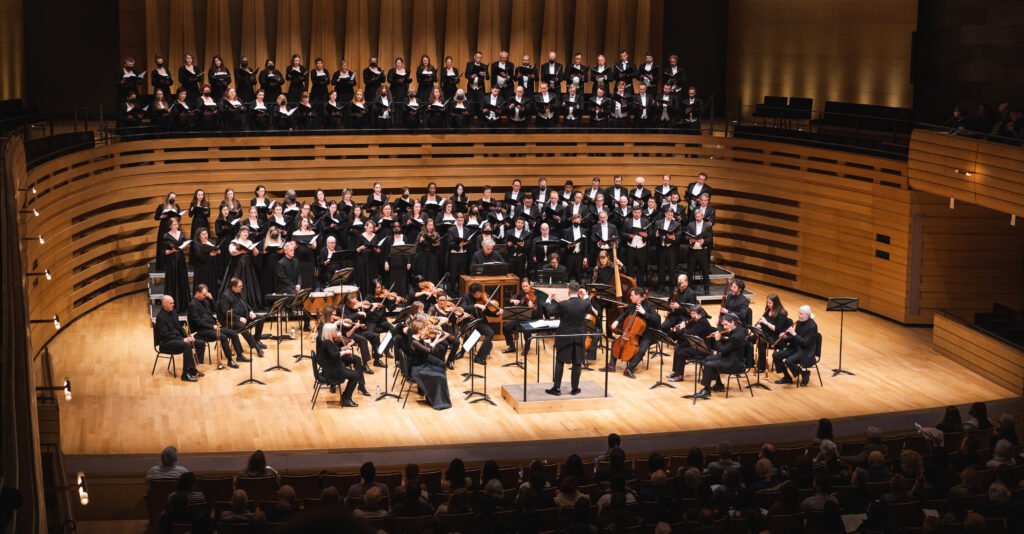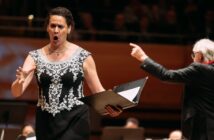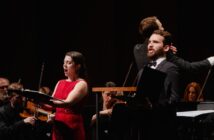One of the pinnacles of the standard choral repertoire, Verdi’s Messa da requiem hasn’t been performed by the Toronto Mendelssohn Choir (TMC) since 2015. It made a triumphant return to the 130 year-old ensemble’s repertoire at the George Weston Recital Hall this past Saturday with a stellar group of Canadian vocal soloists.
Set to Latin texts from the Catholic mass for the dead, Verdi created a stand-alone concert work whose impact far outstrips its clerical beginnings. As musicologist Rena Roussin points out in her program essay, Verdi himself was a life-long critic of the Catholic church, which frowned upon his common law relationship with singer Giuseppina Strepponi (whom he later married). Roussin also mentions how Verdi’s “own religious leanings appear to have moved between agnosticism and atheism,” which partially explains why his Requiem’s ending is suffused with questions and doubt, rather than the conciliation usually associated with masses for the dead.

Toronto Mendelssohn Choir
Breaks from tradition like these have implications for contemporary audiences, who might not be so steeped in the Catholic tradition, but who can instead relate to Verdi’s more universal approach. His musical settings of these texts have the potential to elicit intensely personal responses in their ability to shock, soothe and surprise the listener. From the earth-shattering “Dies irae” (“Day of wrath”) with its booming timpani and blasting trumpets to the more conciliatory and pleading “Recordare, Jesu pie” (“Remember, merciful Jesus”), the Requiem acts as a sort of tabula rasa on which to project our own most deep felt emotions.
TMC’s Artistic Director Jean-Sébastien Vallée led the choir and members of the Toronto Symphony Orchestra in a traversal that felt completely thought-out, and yet, still left room for the soloists to make their own artistic choices. Some of Vallée’s tempi, like in the spine tingling “Sanctus”, were quite pushed, but that only added to the excitement. The TMC was fully up to the task.
Balance between orchestra, soloists and choir was optimal, no doubt helped by the superb acoustics of the hall. The Weston is a chronically underused space, never having recovered from its 1980/90s heyday as Toronto’s premiere smaller concert venue. Here’s hoping more local presenters can find a way to bring regular classical music concerts on this scale back to North York.
The vocal soloists play a huge role in the success of any Verdi Requiem. The mezzo-soprano and soprano especially have as much to sing as would be required by the composer in any of his operas. Mezzo Rose Naggar-Tremblay possesses the kind of even, voluminous, rich tone throughout her range that this ‘role’ requires. Her still presence belied the depth of feeling conveyed by the column of sound she emitted. Optimally, she’ll find a more clear, precise articulation of the text as she continues what will surely be a career-long association with this work.

Jean-Sébastien Vallée. Photo: Tam Photography
Tenor Andrew Haji possesses the sweetest of tones which he did not push no matter how heavy the orchestral forces surrounding him. He sang with complete command of his upper range in the “Ingemisco tamquam reus” (“I moan as one who is guilty”), giving a lesson in Italianate legato singing. Baritone Geoffrey Sirett always seizes on textual drama, taking vocal risks to colour specific words and phrases. His spooky, heady utterance of “Mors stupebit et natura” (“Death and nature will be astounded”) conveyed fear and awe, while never losing track of the core of his tone, which soared throughout the evening.
The Requiem’s requirements for the soprano soloist are manifold: high pianissimi, declarative chest tones, impeccable intonation when singing octaves with the mezzo, smooth bel canto emission. Teiya Kasahara 笠原 貞野 handled all of this with finesse and dramatic intent. The flute-like tone colour of their upper range projected remarkably well, and was always pitch perfect. The true test for the soprano comes at its conclusion with the “Libera me” (“Deliver me”), a grand scena pleading for redemption on the last day. Kasahara mined its drama, bringing bright, rich tone to its soaring phrases followed quickly by a fearless drop into their chest range.
Members of the Toronto Symphony Orchestra played no small part in the action, with special mention going to trumpeters Michael Fedyshyn and Matheus Moraes for their hair raising antiphonal playing from opposite sides of the hall during the “Dies irae.” The TMC itself demonstrated once again why they are one of Canada’s premiere concert choirs. Whether at full roar or most intimate whisper, they were remarkably unified.
The Toronto Mendelssohn Choir performs Verdi’s Requiem again on Tuesday, April 30 2024: www.tmchoir.org













